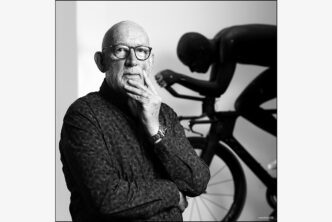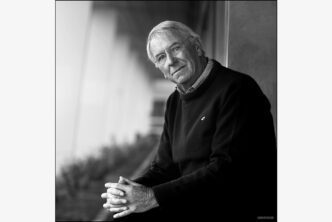Professors retire too. But there are exceptions. Like hydraulic engineer Han Vrijling (1947), who still offers expert advice.
Han Vrijling in his office at Oude Delft. (Photo: Sam Rentmeester).
When Han Vrijling retired in 2013, his presence on campus dropped sharply. His ‘academic son’ (student assistant, graduate and PhD candidate) Bas Jonkman took over his chair in hydraulic engineering. Vrijling limited himself to the occasional lecture on unexpected complications in road and hydraulic infrastructure projects – his specialty.
Consultancy work
After retiring, he shifted his attention to the Horvat consultancy firm where he had already been Technical Director since 2006. He had known founder Bandi Horvat since the latter’s appointment as Professor of Underground Construction in 1995.
“Alongside his professorship, Horvat ran his own consultancy. Sometimes there was a lot of work, sometimes very little. I supplied him with master’s students who wanted to study law or economics later on. Bandi was flexible if they needed a month off to prep for exams, as long as they threw themselves into the next Horvat project afterwards.” Vrijling himself also took on consultancy work at Horvat.
North/South Line
He was also involved with Amsterdam’s North/South metro line as a member of the Veerman Committee. How did that come about? “At one point, the construction of the metro station caused a second subsidence incident on the Vijzelstraat. House façades shifted and doors jammed. Even if it’s just a centimetre, it’s instantly big news.” Job Cohen, then Mayor of Amsterdam, called Cees Veerman. Veerman knew Vrijling and asked for his advice. Was it actually safe to drill under Amsterdam?
‘I prefer hands-on work’
“It definitely was,” says Vrijling. “But you had to do it very carefully. The tunnel boring machine cuts a hole larger than its own diameter – it has to, otherwise it can’t turn corners. But the space around the machine and the tunnel needs to stay under constant pressure using a liquid concrete mix (called grout). If you drop the pressure, the ground can shift by a few centimetres. That might not sound like much, but if your front door won’t open anymore, it’s a disaster.”
Experimental research
Asked whether he still does research or publishes – the standard academic path – he looks puzzled. “I prefer hands-on work. For me, research starts with a real-world problem that doesn’t behave as expected and makes you want to figure it out. Unexpected problems always crop up in practice.”
“For instance, for a long time it was unclear how dumped rock actually behaves under water,” he says, giving an example of experimental research. “We investigated it using a four metre long, wide and deep water tank which TU Delft received from Rijkswaterstaat (Directorate-General for Public Works and Water Management).” It turned out that the rocks spread under water in proportion to the square root of the depth. That finding was published (in Dutch).
Unrealistic projects
Does he still have goals? “No. Well, yes. Healthy grandchildren who turn out well. But that’s looking good so far.”
What worries him more is the apparent decline in scientific literacy – including among politicians. Ministers without a science or engineering background are making decisions on climate, infrastructure and energy. According to Vrijling, this leads to unrealistic projects that fail or go over budget.
CV
Hydraulic Engineer Han Vrijling (1947) graduated in Civil Engineering in 1974. He briefly worked as a project engineer in Saudi Arabia and spent a decade from 1976 on the Eastern Scheldt storm surge barrier. There, he co-developed a probabilistic approach to designing the barrier with a small team. Later, his team tested parts of the design using scale models at the Hydraulic Research Laboratory.
Meanwhile, he earned a degree in economics from Erasmus University in 1980. In 1995, Vrijling was appointed Professor of Probabilistic Design in Hydraulic Engineering at TU Delft. He later succeeded Professor Glerum (Structural Hydraulic Engineering). In 2006, he also became Technical Director at the Horvat & Partners Delft-based consultancy firm. He officially retired at the end of 2013.
Vrijling can often be found on his motorboat, exploring the Frisian lakes from Grouw, returning to his roots. His father, PvdA (labour party) politician Kees Vrijling, was mayor of Idaarderadeel, of which Grouw was the main town, from 1962 until his retirement in 1979.
Do you have a question or comment about this article?
j.w.wassink@tudelft.nl




Comments are closed.